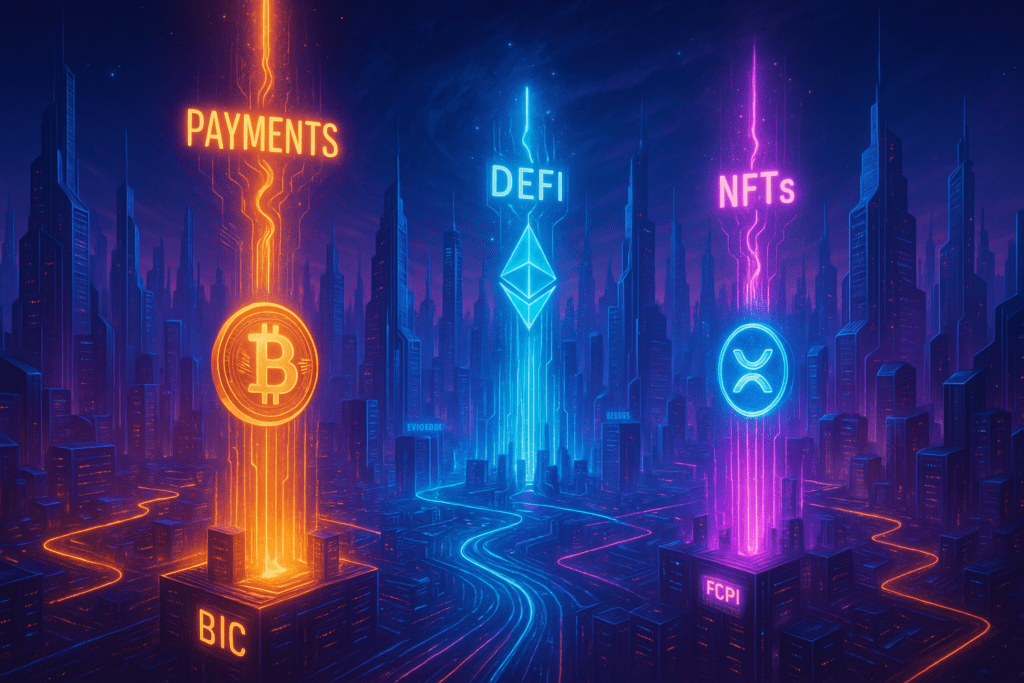Table of Contents
- Introduction: Why Understanding Cryptocurrency Matters in 2025
- What Is a Cryptocurrency? The Basics for Beginners
- How Does It Work? Blockchain, Mining, Wallets
- Major Players: Bitcoin (BTC), Ethereum & Ripple
- Why Cryptocurrencies Matter in 2025: Use Cases & Trends
- Risks, Regulation and What You Should Know
- Forecasts: Where Cryptocurrency Could Be Heading
- Conclusion: Key Takeaways for New Users
Online advertising service 1lx.online
Introduction: Why Understanding Cryptocurrency Matters in 2025
Cryptocurrency is no longer a futuristic idea — it’s a core part of how the modern economy works. In 2025, understanding what crypto is and how it functions is just as important as knowing how online banking operates.
If you’re new to the digital asset world, our Newbies Cryptocurrency section is the best place to start. You’ll find simple explanations, beginner tips, and crypto insights written for first-time investors and everyday users.
What Is a Cryptocurrency? The Basics for Beginners
A cryptocurrency is digital money built on blockchain technology — a decentralized database that records every transaction transparently.
In simple terms, it’s money that doesn’t need banks. You can send it anywhere in the world instantly, at any time, with complete control over your funds.
Main characteristics
- Decentralized: No government or company controls it.
- Transparent: Transactions are recorded publicly.
- Secure: Protected by cryptography.
- Borderless: Works globally without currency conversion.
Cryptocurrency is a new form of financial independence — the same way Bitcoin (BTC) changed how we think about value online.
Online advertising service 1lx.online
How Does It Work? Blockchain, Mining, Wallets
Cryptocurrency operates on a blockchain — a network of computers (nodes) that share and verify data collectively.
Blockchain
Each “block” of data contains verified transactions. Once added, it can’t be changed. This ensures trust without needing banks.
Mining and Validation
Online advertising service 1lx.online
- Bitcoin uses proof-of-work (PoW), where computers solve complex puzzles.
- Ethereum now uses proof-of-stake (PoS), which is energy-efficient.
- Ripple (XRP) validates through its own consensus system optimized for speed.
Wallets and Keys
You hold cryptocurrency in a digital wallet. It has two keys:
- Public key: your wallet address (like your account number).
- Private key: your password — never share it.

Major Players: Bitcoin (BTC), Ethereum & Ripple
Bitcoin (BTC)
Bitcoin is the pioneer — the first decentralized currency and the benchmark for all others. Its supply is limited to 21 million coins, making it a digital equivalent of gold. Read more in our Bitcoin News section.
Ethereum (ETH)
Ethereum powers decentralized apps, smart contracts, and the entire DeFi industry. It’s the innovation engine behind today’s blockchain revolution. Explore the latest insights in our Ethereum News.
Ripple (XRP)
Ripple is designed for banks and institutions that send money globally. Its network allows faster and cheaper transactions across borders. You can follow updates in our Ripple News.
Why Cryptocurrencies Matter in 2025: Use Cases & Trends
By 2025, crypto isn’t just an investment tool — it’s woven into everyday technology.
Real-World Use Cases
- Digital payments: Millions now use crypto to send and receive money globally.
- DeFi & smart contracts: Financial tools run directly on blockchains, replacing traditional middlemen.
- NFTs & digital art: Artists and brands tokenize creativity for global audiences.
- AI & blockchain synergy: Smart contracts power AI systems and vice versa.

Risks, Regulation and What You Should Know
Cryptocurrency offers freedom — but also responsibility.
Volatility
Prices fluctuate quickly; one day’s gain can become another’s loss.
Security
Hackers target wallets and exchanges. Always enable two-factor authentication and use hardware wallets.
Regulation
Many governments now classify Bitcoin and Ethereum as digital assets, but rules differ worldwide.
Stay updated with our Regulation & Policy News to track evolving global laws.

Forecasts: Where Cryptocurrency Could Be Heading
2025–2026
- Bitcoin adoption continues, with ETFs and banks entering the market.
- Ethereum scales further with Layer-2 and AI integration.
- Ripple regains momentum after regulatory clarity.
2027–2030
- Real-world assets (property, art, stocks) become tokenized.
- Crypto wallets integrate seamlessly with traditional banking apps.
- Stablecoins dominate cross-border transactions.
Beyond 2030
- Governments issue blockchain-based IDs.
- Web3 merges with AI, automation, and finance.
- Bitcoin may evolve into a true digital reserve asset.
Conclusion: Key Takeaways for New Users
In 2025, cryptocurrency is no longer “the future” — it’s the present.
Here’s what to remember:
- Bitcoin represents trust and scarcity.
- Ethereum drives innovation and applications.
- Ripple connects traditional finance to the blockchain era.
- Education and awareness protect your investment.
To continue learning, visit our Newbies Cryptocurrency hub — your starting point for understanding, investing, and staying safe in crypto.
Our creator. creates amazing NFT collections!
Support the editors - Bitcoin_Man (ETH) / Bitcoin_Man (TON)
Pi Network (Guide)is a new digital currency developed by Stanford PhDs with over 55 million participants worldwide. To get your Pi, follow this link https://minepi.com/Tsybko and use my username (Tsybko) as the invite code.
Binance: Use this link to sign up and get $100 free and 10% off your first months Binance Futures fees (Terms and Conditions).
Bitget: Use this link Use the Rewards Center and win up to 5027 USDT!(Review)
Bybit: Use this link (all possible discounts on commissions and bonuses up to $30,030 included) If you register through the application, then at the time of registration simply enter in the reference: WB8XZ4 - (manual)
